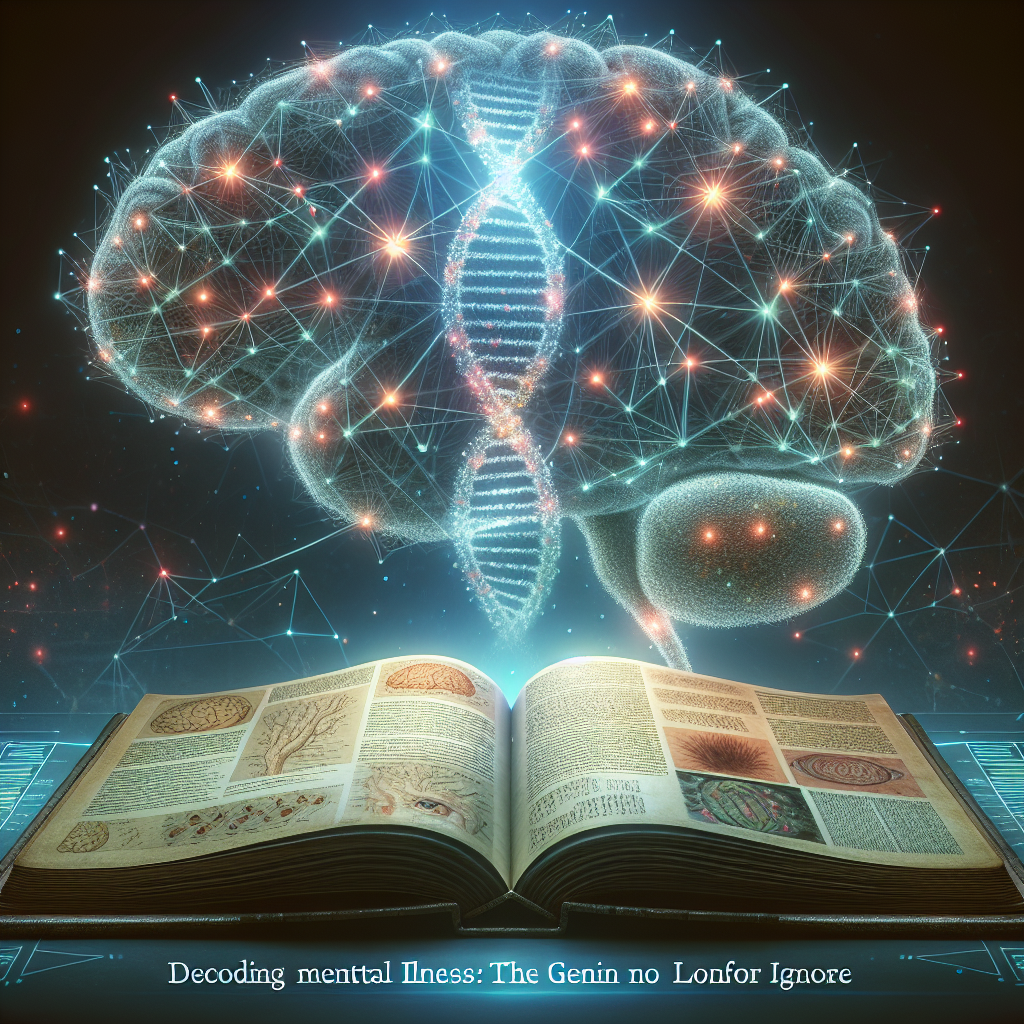
Decoding Mental Illness: The Genetic Links We Can No Longer Ignore
Introduction
In a world where mental health awareness has gained unprecedented traction, the urgency to understand its origins remains unparalleled. Mental illness affects millions of individuals worldwide, manifesting in various forms, from anxiety disorders to schizophrenia. As we delve into the complexities of mental health, one question looms large: what underpins these conditions, and can we unravel their secrets? Decoding Mental Illness: The Genetic Links We Can No Longer Ignore emerges as a critical theme, challenging us to consider the genetic factors that contribute to mental health disorders.
Recent advancements in genetics have paved the way for innovative research, revealing that our genetic makeup plays a pivotal role in predisposing individuals to mental illness. This article aims to explore the intricate dance between genetics and mental health, providing insights, real-world case studies, and a thorough understanding of why these genetic links cannot be overlooked any longer.
The Genetic Landscape of Mental Illness
Understanding the Genetic Contribution
The intricate relationship between genetics and mental illness can be traced as far back as the 19th century. Early work laid the groundwork for the prevailing hypothesis that mental disorders have a hereditary component. Epidemiological studies have repeatedly pointed out that individuals with a family history of psychiatric conditions are at a higher risk of developing similar issues.
Table 1: Family History and Mental Illness Risk
| Family History | Risk of Development |
|---|---|
| No family history | 10% |
| One affected family member | 20% |
| Two or more affected members | 50% |
The groundwork was further solidified with the Human Genome Project, which opened doors to understanding the specific genes implicated in various mental disorders. From single nucleotide polymorphisms (SNPs) linked with bipolar disorder to gene-environment interactions affecting schizophrenia, research shows that a significant portion of our susceptibility to mental illnesses is written in our DNA.
Genes vs. Environment: The Tug-of-War
While genetics plays a crucial role, the environment also holds substantial sway. The interplay between genetic predispositions and environmental triggers—such as trauma, stress, and upbringing—creates a complex bio-psychosocial model of mental health.
Studies have illuminated this interaction, indicating that identical twins raised apart often show differing mental health outcomes based on their environmental experiences. This reality underscores the validation that Decoding Mental Illness: The Genetic Links We Can No Longer Ignore demands careful consideration of these dual influences.
Case Studies
Case Study 1: The Schizophrenia Gene
A landmark study published in 2014 identified a specific gene, COMT, involved in dopamine metabolism, which has been linked to an increased risk of schizophrenia. Researchers discovered that variations in the COMT gene could double the risk of developing the disorder. This case exemplifies how Decoding Mental Illness: The Genetic Links We Can No Longer Ignore can provide clarity to both researchers and clinicians, potentially guiding targeted therapies for those affected.
Case Study 2: The Role of the SLC6A4 Gene in Depression
The SLC6A4 gene, responsible for the serotonin transporter, has been associated with depression. A meta-analysis revealed that specific variants within this gene can increase vulnerability to major depressive disorder when coupled with stressful life events. Understanding these genetic links opens avenues for personalized treatments that consider an individual’s genetic makeup, underscoring that Decoding Mental Illness: The Genetic Links We Can No Longer Ignore is not just an academic exercise—it’s a pathway to better mental health solutions.
Case Study 3: Anxiety Disorders and Genetic Predisposition
Researchers at the University of Michigan found that variations in the gene GABRA2 could be linked to increased risks of anxiety disorders. This genetic variation may affect the body’s response to stress, contributing to the onset of anxiety. Again, Decoding Mental Illness: The Genetic Links We Can No Longer Ignore gains importance as we consider how this information can be harnessed to tailor prevention strategies and therapeutic interventions.
Genetic Research Breakthroughs
The Role of Genome-Wide Association Studies
Genome-Wide Association Studies (GWAS) have emerged as a powerful tool in identifying the genetic underpinnings of mental health disorders. By analyzing specific populations, researchers can identify genetic variations linked to conditions like bipolar disorder and major depressive disorder.
Table 2: GWAS Findings in Mental Health
| Disorder | Genes Identified | Risk Increase (%) |
|---|---|---|
| Bipolar Disorder | ANK3, CACNA1C | 30-40% |
| Major Depressive Disorder | FTO, GCH1 | 20-50% |
| Schizophrenia | ZNF804A, TCF4 | 40-60% |
These findings bolster the narrative that Decoding Mental Illness: The Genetic Links We Can No Longer Ignore should be a priority not only among researchers but also among policymakers aiming to establish more effective mental health interventions.
Exploring Epigenetics
Epigenetics broadens the conversation around genetics and mental illness. It pertains to how environmental factors can lead to changes in gene expression without altering the DNA itself. For example, studies have shown that trauma can switch on or off certain genes, leading to increased risk for disorders later in life. This dimensional approach emphasizes that merely identifying genetic markers isn’t sufficient; we must also explore how these genes interact with external conditions.
Impact on Treatment and Recovery
Personalized Medicine in Mental Health
The integration of genetic knowledge into treatment frameworks signals a new era in mental health care. Personalized medicine, which tailors interventions based on individual genetic profiles, can lead to more effective and targeted treatments. Practitioners equipped with insights from genetic testing can better predict treatment responses, ultimately improving outcomes for patients.
Mental Health Advocacy and Awareness
As we continue to decode the threads of genetics in mental illness, advocacy plays a crucial role in shaping public perception. Understanding that mental health disorders have a genetic component can reduce stigma, encouraging individuals to seek help without fear of judgment. Decoding Mental Illness: The Genetic Links We Can No Longer Ignore empowers not only those suffering from these conditions but also society at large, fostering a more compassionate understanding of mental health.
Conclusion
The journey toward truly understanding mental illness is a multifaceted endeavor steeped in genetic intricacies and environmental influences. It is imperative that we embrace the notion that Decoding Mental Illness: The Genetic Links We Can No Longer Ignore is more than a catchphrase—it’s a necessary shift towards empathy, tailored treatment, and a collaborative approach to health.
As genetics and mental health research continue to evolve, we are reminded that knowledge is power. By unpacking the links between DNA and mental disorders, we can forge a path to healing that respects both the biological and the experiential aspects of mental health.
Call to Action
Let’s inspire a movement that embraces the knowledge we’ve gained and spreads awareness of the genetic factors that impact mental health. Engage with your community, share your insights, and advocate for more research, education, and support for mental health initiatives. Together, we can empower those affected by mental illness to seek treatment and foster understanding among all.
FAQs
1. Can mental illness be purely attributed to genetics?
While genetics significantly contribute to mental health disorders, they interact with various environmental factors. It’s essential to consider the holistic perspective that includes both genetic predispositions and life experiences.
2. How can I find out if I have a genetic predisposition to mental illness?
Genetic testing can provide insights into your potential genetic risks related to mental illnesses. Consult with a healthcare provider or a genetic counselor to discuss the suitability and implications of testing.
3. Can knowing my genetic predisposition help in treatment?
Yes, understanding your genetic predisposition can guide healthcare providers in tailoring treatments that may work better for you, thus increasing the effectiveness of interventions.
4. Are there lifestyle changes that can mitigate genetic risks for mental illness?
Absolutely! Healthy lifestyle choices—such as regular exercise, a balanced diet, good sleep hygiene, and stress management—can help mitigate some of the risks associated with genetic predispositions.
5. Is there ongoing research about genetics and mental health?
Yes, research in this area is rapidly evolving, with studies continually being published that expand our understanding of the genetic factors associated with mental illness and how they can inform therapeutic strategies.










